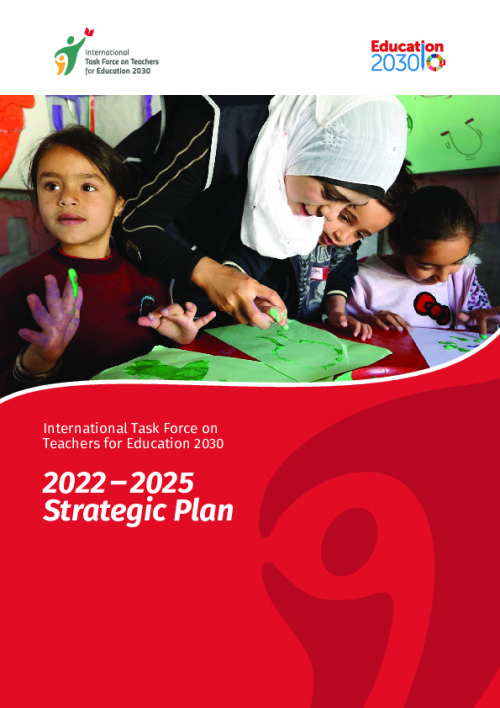Our mission
Among the numerous determinants of quality education and learning outcomes, getting a qualified and motivated teacher into the classroom is the single-most important school-based factor. The ambitious SDG 4-Education 2030 framework must make considerable progress on teacher and teaching issues to meet the wider challenges of education systems.
Vision
The vision of the International Task Force on Teachers for Education 2030 is clear: teaching should be a valued profession and every learner should be taught by qualified, motivated and empowered teachers within well-resourced, efficient and effectively governed systems to foster learning and achieve inclusive and equitable quality education for all.
Mission
To achieve this vision, the TTF’s mission is to mobilize governments and other stakeholders for the advancement of teachers and quality learning, acting as a catalyst of global, regional and national efforts through knowledge production and dissemination, advocacy and policy learning.
The "teacher gap" – quantitative and qualitative – is the most notable challenge regarding teachers and teaching the world faces today. Not only are there not enough teachers in many countries, large numbers have also not received sufficient training. The TTF believes the most efficient approach to closing the gaps is to adopt holistic national teacher policies that include the widest range of interlocking dimensions affecting teachers and teaching.
The TTF’s mission is aligned with the SDG 4-Education 2030 framework and other international teacher-related normative instruments, such as the ILO/UNESCO Recommendation concerning the Status of Teachers (1966) and UNESCO Recommendation concerning the Status of Higher-Education Teaching Personnel (1997).
Main Lines of Action
To fulfil its mission the TTF articulates its programme around three Main Lines of Action as defined in its current Strategic Plan 2022-2025. The logic is that by (1) providing state-of-the-art knowledge on teachers and teaching, (2) creating or maintaining an awareness of the priority of teachers in the education agenda, and (3) fostering regional and national policy learning in support of holistic teacher policy development, stakeholders will be equipped to tackle teacher gaps in their respective countries and contexts.
1) Knowledge production and dissemination
The TTF will continue identifying and filling knowledge gaps on teachers and teaching, and it will contribute to the monitoring of SDG 4.c. through the collation and dissemination of relevant statistics and indicators.
To ensure that knowledge and evidence influence policy learning and formulation, the TTF’s knowledge hub will provide information and knowledge in formats that are adapted to the various levels at which TTF members interact: the international, regional, and national levels. There will also be an emphasis on drawing on the strength of the whole TTF partnership to identify existing resources, co-create new ones and build partnerships and synergies for knowledge-sharing. For this, the TTF will continue developing its knowledge platform and encourage its use as an avenue for interaction between members.
2) Advocacy
The TTF seeks to ensure that teacher issues remain at the top of the education agenda, and prominent at the national, regional and international levels. International and regional agenda setting is essential to advocate for adequate policies and increased financing to solve the “teacher crisis”.
The ambition of the TTF is to continue to play a strategic role within the global education architecture and provide evidence-driven advocacy messages in favour of teachers, to influence the members of the global bodies, including the SDG 4 High-Level Steering Committee.
The TTF members will work together to identify key advocacy messages and opportunities for campaigns to influence the global agenda at both the political and the technical levels.
3) National and regional policy learning
The TTF will foster regional and national policy learning in support of holistic teacher policy development, based on members’ needs.
With the underlying assumption that an approach which is closer to the realities on the ground is more likely to promote evidence-based policy formulation, the TTF will increase its focus on the regional and national level and with existing regional mechanisms as an essential link between policy learning and policy change. While large fora such as the Policy Dialogue Forum are well suited to create a dynamic at the global level, the TTF will concentrate its efforts on fostering policy learning through more regional channels. This will give additional impetus to emulation between countries to introduce policy changes in the spirit of south-south cooperation and appropriation of good practices and common standards through improved contextualization.
Strategic Plan 2022-2025

Knowledge production and dissemination
Knowledge gaps are identified and filled, and monitoring strengthened to ensure that relevant and up-to-date knowledge on teachers and teaching is available to inform the formulation and implementation of comprehensive teacher policies (through Knowledge production and dissemination — MLA 1).

Advocacy
The critical role of teachers and quality teaching is advocated for, and key messages are adopted and amplified by TTF members and beyond (through Advocacy — MLA 2).

National and regional policy learning
Regional and national policy learning is fostered in support of holistic teacher policy development, based on members’ needs (through National and regional policy learning — MLA 3).
